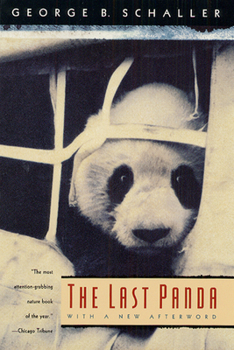The Last Panda
Select Format
Select Condition 
Book Overview
Dependent on a shrinking supply of bamboo, hunted mercilessly for its pelt, and hostage to profiteering schemes once in captivity, the panda is on the brink of extinction. Here, acclaimed naturalist George Schaller uses his great evocative powers, and the insight gained by four and a half years in the forests of the Wolong and Tangjiahe panda reserves, to document the plight of these mysterious creatures and to awaken the human compassion urgently...
Format:Hardcover
Language:English
ISBN:0226736288
ISBN13:9780226736280
Release Date:April 1993
Publisher:University of Chicago Press
Length:312 Pages
Weight:1.40 lbs.
Dimensions:1.1" x 6.2" x 9.3"
Customer Reviews
3 ratings
Pandas should beware of do-gooders
Published by Thriftbooks.com User , 15 years ago
Despite his universal appeal, the panda is an insult to both good design and truth in advertising. Is he a black bear with white patches, an aberrant raccoon or something unique? Whatever, he isn't a as cuddly and friendly as he looks. And considering that he has an inefficient digestive system melded to a diet of unnourishing bamboo, it's rather a surprise that he has beaten the evolution game thus far. (And he doesn't even chew the bamboo thoroughly.) He isn't likely to keep beating the odds, according to George Schaller, one of our best-known literary zoologists. Schaller spent some time with the World Wildlife Fund in the early '80s trying to set up a joint Chinese-international research program into the mysterious panda. They learned a lot, duly reported in specialist publications. Only a decade later did Schaller get around to writing a popular account of his panda experience, similar to his earlier books about tigers, lions etc. Yet not so similar, either. While Schaller has always been interested in preservation of large mammals, "The Last Panda" is more alarmist and packs more of an emotional wallop. That is, once you get past (or skip) the first 50 pages, which recount his tiresome interactions with the sclerotic Chinese bureaucracy. This is neither new nor interesting nor surprising, though it is of vast importance, whether you are a panda or a peasant. But especially if you are a panda. Schaller always writes with both grace and precision, and here also with passion and frustration. "Too often treatises on endangered species seem to be mere memorials," he writes, though he went into the project determined to have an impact on the beast's future. Ten years later, it looked as if Schaller was just one more foreigner ground down by China, which its own people exceeding fine, too. "I was prepared to fight on their behalf, to rage and scream if necessary," he writes. But "there's a limit to the art of endurance." Non-Chinese also come in for criticism, especially at zoos that "rent" pandas. The Chinese have never given the pandas an even break, but as long as both species were primitive and backward it was a standoff. Modernity, which the Chinese have adopted except in the fields of law and ethics, has given them the upper hand over the pandas. But not only in China. There is a school of thought now which says large land mammals cannot co-exist with humans at the densities humans are achieving for themselves. That may be proven wrong, but it looks as if it can't happen soon enough for the pandas. Though it has its lovely moments, "The Last Panda" is a sad book. A year after the hardcover edition was published in 1993, Schaller issued a paperback, which included a relatively upbeat new afterword. The Chinese government, he reported, had improved its panda policies, with regular successes in the captive breeding program. Ten years before, Schaller had been very pessimistic about Chinese suspiciousness of outside ideas, "but I have found that
Moving and highly readable
Published by Thriftbooks.com User , 18 years ago
This book left me with a feeling one has after seeing a very moving film--sad, but reflective and motivated. I'll think about this book and any global conservation partnership differently now. The Last Panda gives equal time to the ecology and lives of wild pandas, but also to the difficulties of forging an international conservation project between Western and Eastern cultures, in this case the WWF and the Chinese government. Bureacratic apathy, even malfeasance, differing ideas of what constitutes "research" and even sad grasps at publicity using pandas as pawns disrupt and ultimately damage the precious few pandas in the study. Schaller's droll voice lends a small bit of humor to what must have been an extreme challenge in self-control when dealing with the friction between involved parties. This is not an uplifting success story, but almost rather a story of candid warning of the realities of forging global partnerships in any realm. Ultimately, concerned citizens, researchers, NGOs and governments have to remember why we're all involved: not for personal glory or public relations, but to save the endangered animal.
A comprehensive study of the life of the giant panda.
Published by Thriftbooks.com User , 25 years ago
In this book, George Schaller depicts the giant panda of China not only as a "cute" and lovable creature, but that it is also in a struggle to overcome extinction. I enjoyed reading this book because George Schaller writes down his most inner thoughts and feelings regarding the panda project in China. He does not hold anything back from the reader. From reading this book, I learned about the plight of the panda that other books have failed to mention.





